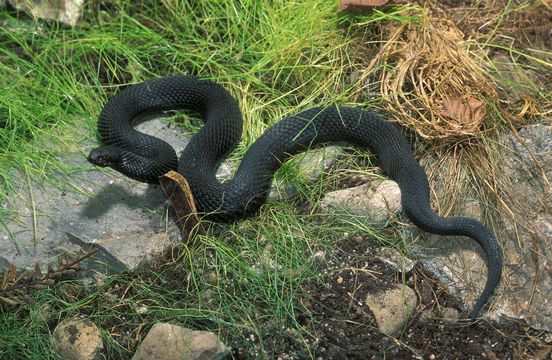
Following a fly infestation in Volgograd—a southwestern city in Russia and one of the places hosting the 2018 World Cup—snakes are now migrating down the Volga River to the Volga Sports Arena. Among the snakes are black vipers, the species Vipera nikolskii, whose bites could be fatal. The vipers are about 2 and a half feet in length when fully grown.
Blocknot, one of the first local news sources to cover the sightings, reported spotting this species Monday, when team members of the city's search and rescue recorded five sightings of snakes in a single day from.
On Tuesday,Volgograd's head of search and rescue, Alexander Sivolobov, said this species can easily cover distances of 2 miles and has the ability to creep ashore on land, according to The Moscow Times.
The vipers' arrival was just in time for the World Cup's last H game, which includes matches between Senegal and Columbia as well as Japan and Poland. Russia's response has been to send search-and-rescue teams to divert and remove all the snakes before they incite panic among the city's 5,000 visitors and general population. How or why the endemic species migrated has so far stumped the ecological and biological communities in Volgograd. Also known as Nikolsky's viper, the snake usually resides in a forest.
"All vipers are venomous, but not necessarily poisonous. They naturally avoid human areas," said Dr. Frank T. Burbrink, curator of herpetology at the American Museum of Natural History.
When a viper bites, its two swiveling fangs operate like syringes. According to Burbrink, two types of venom that can be found in snakes are hemotoxic or neurotoxic venom. Burbrink said hemotoxic venom is the type that destroys tissue—the reason why hemotoxic bites tend to hurt—whereas neurotoxic venom would damage the nervous system. However, according to Burbrink, a venomous snake bite may not necessarily be fatal.
"It depends on what the snake was doing," Burbrink said. Snakes who have eaten have injected their venom into their prey and will inevitably allow less venom to pass through in the case of a second bite. This is known as a "dry bite," which Burbrink estimated makes up approximately 25 percent of snake bites.
Uncommon Knowledge
Newsweek is committed to challenging conventional wisdom and finding connections in the search for common ground.
Newsweek is committed to challenging conventional wisdom and finding connections in the search for common ground.
About the writer
To read how Newsweek uses AI as a newsroom tool, Click here.








